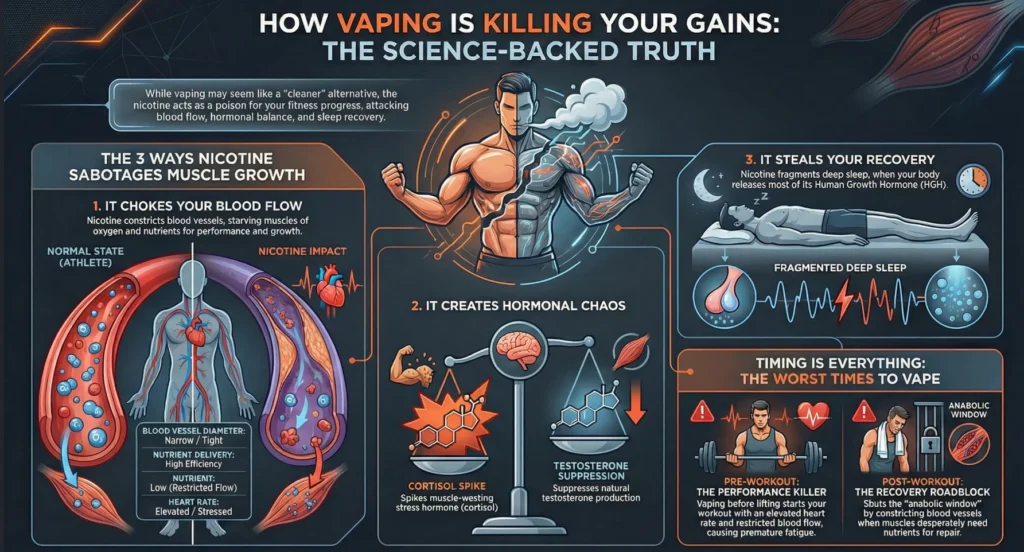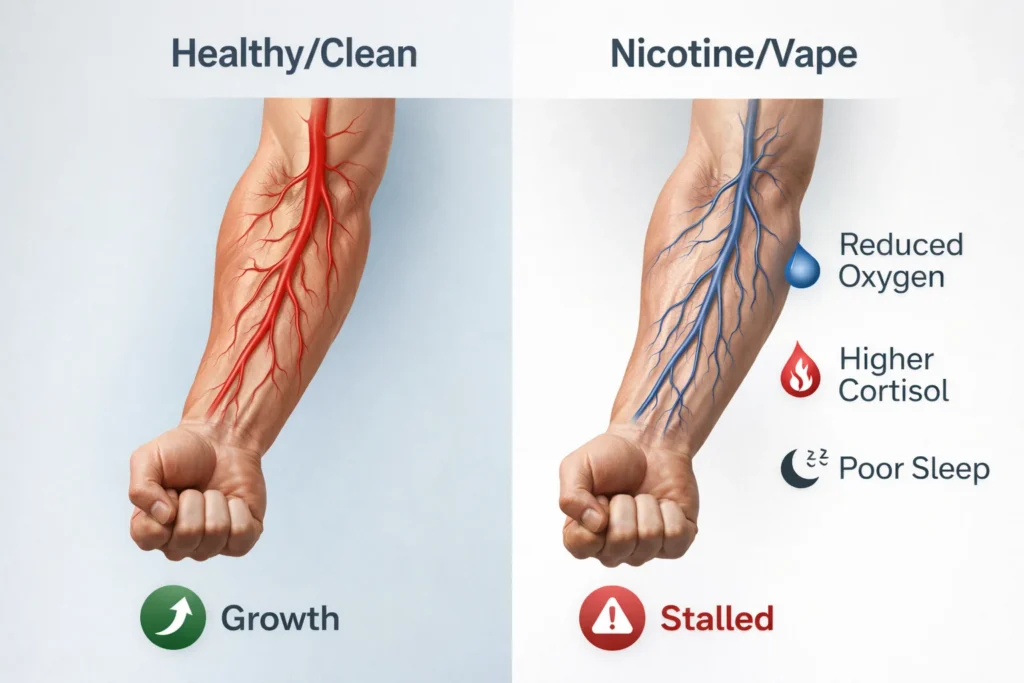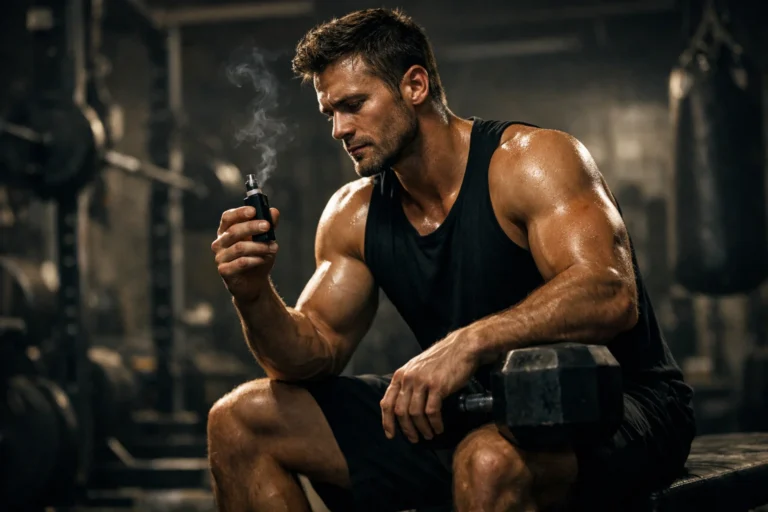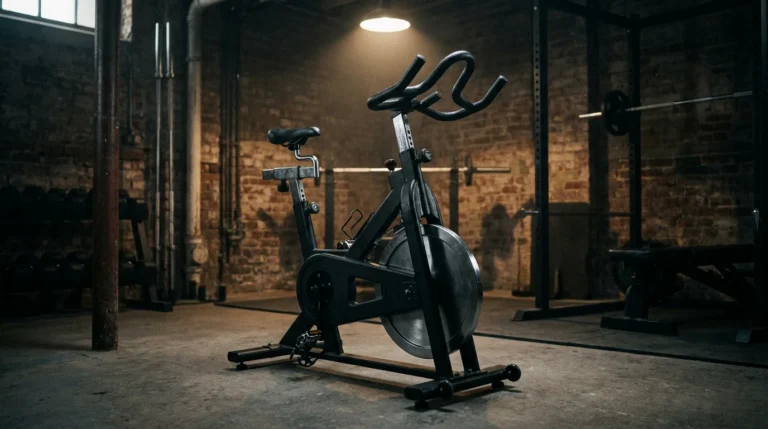Does vaping affect muscle growth? It’s a question that’s becoming as common in the locker room as “how much do you bench?” You’re hitting the gym, tracking your macros, and maybe even optimizing your testosterone levels, but you’re still reaching for that vape between sets or after a long day.
The short answer: Yes, vaping with nicotine acts like a slow-release poison for your progress. It doesn’t just “slightly” get in the way; it attacks the very biological foundations—blood flow, hormones, and recovery—that your muscles need to grow.
🚀 Key Takeaways: How Vaping Impacts Your Gains
- Nicotine is the Culprit: While the vapor itself is a respiratory concern, nicotine is the primary drug sabotaging your muscle protein synthesis.
- The “Strangled” Pump: Nicotine constricts your blood vessels, meaning fewer nutrients and less oxygen reach your muscles during and after a workout.
- Hormonal Chaos: Chronic vaping can spike cortisol (the stress hormone) and suppress testosterone, creating a catabolic (muscle-wasting) environment.
- Sleep Theft: As a stimulant, nicotine fragments your deep sleep, which is when your body releases the bulk of its Human Growth Hormone (HGH).
- Recovery Roadblock: Vaping post-workout closes the “anabolic window” by restricting blood flow right when your muscles need repair materials most.
The Prime Perspective: My Lesson Learned the Hard Way
🏃♂️ The Prime Perspective
Back in the early 2000s, I spent a lot of time in “hardcore” gyms where everyone had a vice. Some guys lived on pre-workouts that would give a horse a heart attack, and others were chain-smoking in the parking lot. I remember one guy, let’s call him “Big Ed.” Ed was a monster, but he was always complaining about “flat” muscles and a lack of pump, even when he was hitting heavy triples.
He’d step outside for a cigarette every 20 minutes. I didn’t think much of it then, but looking back at the science, Ed was literally strangling his muscles from the inside out. He was working twice as hard as everyone else just to stay in the same place. Vaping is the modern version of that. It feels cleaner, it smells like blueberries, but the nicotine is doing the exact same thing to your vascular system. I’ve seen guys stall for months on their progressive overload plans, only to see their strength explode the minute they put down the vape. Don’t let a “cleaner” delivery system fool you—nicotine is a gain-killer, plain and simple.
1. The Vasoconstriction Factor: Choking Your Muscle Growth

The most immediate way nicotine hurts you is through vasoconstriction. Think of your blood vessels like garden hoses. When you’re training, you want those hoses wide open to deliver “water” (oxygen and nutrients) to your “plants” (muscles).
Nicotine acts like a giant foot stepping on the hose.
How it Hits Your Workout Performance
When you vape, your heart rate spikes and your blood vessels tighten. This forces your heart to work harder to push blood through a narrower opening. In the gym, this translates to:
- Reduced “Pump”: That satisfying feeling of muscle fullness is caused by blood filling the tissue. Nicotine prevents this, making your muscles feel “flat.”
- Premature Fatigue: Without adequate oxygen, your muscles switch to anaerobic metabolism faster, leading to a buildup of lactic acid and that burning sensation that ends your set early.
- Impaired Waste Removal: Blood doesn’t just bring the good stuff; it takes away the bad stuff. Constricted vessels mean metabolic waste sticks around longer, slowing you down.
| Physiological Marker | Normal State (Athlete) | Nicotine Impact |
| Blood Vessel Diameter | Wide/Relaxed (Vasodilation) | Narrow/Tight (Vasoconstriction) |
| Nutrient Delivery | High efficiency | Low (due to restricted flow) |
| Heart Rate | Controlled/Responsive | Elevated/Stressed |
2. Hormonal Sabotage: Testosterone vs. Cortisol
If you want to build muscle, you need to be in an anabolic state. That means your muscle-building hormones (like testosterone) are high, and your muscle-breaking hormones (like cortisol) are low.
Nicotine flips the script.

The Cortisol Spike
Nicotine is a stimulant that triggers your body’s “fight or flight” response. This release of adrenaline is followed by a spike in cortisol. While a little cortisol is normal during a HIIT at home session, chronic elevation is a nightmare. High cortisol is catabolic, meaning it signals your body to break down muscle tissue for energy and store fat instead.
The Testosterone Suppression
Research suggests that long-term nicotine exposure can suppress the hypothalamic-pituitary-gonadal (HPG) axis. This is the control center for your natural testosterone production. When T-levels drop, your ability to recover from kettlebell complexes or heavy squats drops with it.
💡 What Most Guys Miss: The Myostatin Connection
While most articles talk about blood flow, they miss a crucial genetic signal. Studies have shown that nicotine can actually increase the expression of myostatin. Myostatin is a protein that acts as a “ceiling” for muscle growth. High levels of myostatin literally tell your body not to grow more muscle. By vaping, you might be genetically signaling your body to stay small, regardless of how much protein you eat.
3. The Recovery Thief: Sleep and Growth Hormone
You don’t build muscle in the gym; you build it in bed. This is where the importance of rest and recovery becomes real.
Deep Sleep and HGH
The vast majority of your Human Growth Hormone (HGH) is released during “slow-wave” or deep sleep. Nicotine is a powerful stimulant with a half-life of about two hours. If you vape in the evening, you’re fragmenting your sleep architecture.
Even if you “sleep” for 8 hours, nicotine prevents you from reaching the deepest stages of rest. This means your HGH levels never peak, leaving your muscles un-repaired and your central nervous system fried.
The “Micro-Withdrawal” Cycle
Because nicotine is so addictive, your body actually starts going into withdrawal while you sleep. This causes “micro-arousals”—tiny moments where you wake up or move into a lighter stage of sleep without realizing it. You wake up feeling like you’ve been hit by a truck, and your gym performance suffers the next day.
4. Timing the Hit: When is Vaping Worst?
Most guys think a quick vape before or after a workout is fine. In reality, these are the two worst times to do it.
Pre-Workout Vaping
Vaping before you lift is like putting the parking brake on while you try to drive. You’re trying to achieve progressive overload, but your heart rate is already elevated, your blood pressure is up, and your vessels are tight. You’ll run out of gas long before your muscles are actually challenged.
Post-Workout Vaping (The Anabolic Window)
After a workout, your muscles are primed to absorb nutrients. This is why we care about post-workout supplements. By vaping post-workout, you constrict blood flow right when the “delivery trucks” need to get to the “construction site.” You are effectively shutting down your recovery window.
| Time of Day | Effect on Body | Impact on Muscle |
| Pre-Workout | High heart rate / High BP | Poor endurance / No pump |
| During Workout | Adrenaline spike / Tight vessels | Rapid fatigue |
| Post-Workout | Nutrient restriction | Slow recovery / Muscle soreness |
5. Beyond Nicotine: Does “Nicotine-Free” Solve It?
Many guys switch to 0mg juices, thinking they’ve found a loophole. While this removes the vasoconstriction and hormonal issues, it’s not a free pass.
Vaping involves inhaling aerosolized Propylene Glycol (PG) and Vegetable Glycerin (VG). Emerging research (such as studies from Frontiers in Pharmacology) suggests these carriers can cause inflammation in the lung lining and reduce oxygen uptake.
If your lungs can’t move oxygen efficiently into your blood, your muscles can’t perform at 100%. For an athlete, any reduction in respiratory efficiency is a net loss.
6. Comparison: Vaping vs. Other Nicotine Sources
Is vaping worse than Zyn pouches or nicotine gum? From a muscle-building perspective, it’s a wash. The delivery method (lungs vs. gums) changes the respiratory impact, but the systemic impact—the heart rate, the cortisol, and the vasoconstriction—is caused by the nicotine in your bloodstream.
If you’re serious about your core workouts for men or your powerlifting total, “less bad” isn’t the goal. Optimization is.
✅ Your 24-Hour Action Plan
- Step 1: Eliminate all nicotine use for 4 hours before and after your workout. This protects your performance and your anabolic recovery window.
- Step 2: Increase your intake of L-Citrulline or Nitric Oxide boosters (like beetroot juice) to help counteract current vasoconstriction and improve blood flow.
- Step 3: Track your Sleep Recovery. Use a wearable like the WHOOP 4.0 to see exactly how your evening vape sessions are tanking your HRV and deep sleep scores.
Conclusion: The Final Verdict on Vaping and Gains
So, does vaping affect muscle growth? Yes, in almost every way that matters. It strangles your blood flow, messes with your muscle-building hormones, and steals the deep sleep you need to grow.
If you’re looking for a beginner’s guide to fitness, step one is usually to cut out the junk. Nicotine is the ultimate “metabolic junk.” You wouldn’t skip your protein shake or miss your leg day, so why would you actively choose to shrink your blood vessels and spike your cortisol?
If you want to reach your prime, it’s time to choose between the cloud and the gains. I know which one I’d pick.
FAQ: Does Vaping Affect Muscle Growth?
Can I still build muscle if I vape?
Yes, you can build muscle while vaping, but you will not build it as quickly or as efficiently as you would without nicotine. You are essentially working with a self-imposed handicap.
How long after quitting vaping will my gains improve?
You’ll see improvements in blood flow and heart rate within 48 to 72 hours. However, for your testosterone-to-cortisol ratio and sleep architecture to fully normalize, it usually takes 3 to 6 weeks of being nicotine-free.
Does nicotine kill testosterone?
There is strong evidence that chronic nicotine use can suppress natural testosterone production and increase the “muscle-killing” hormone cortisol.
Is vaping before a workout bad?
Vaping before a workout is highly detrimental. It increases your heart rate and constricts blood vessels, leading to less oxygen delivery to your muscles and a much weaker “pump.”
Are nicotine pouches (like Zyn) better for muscle growth than vaping?
While nicotine pouches are better for your lungs, they still deliver nicotine to your bloodstream. This means they cause the same vasoconstriction and hormonal issues as vaping, still hindering your muscle growth potential.








